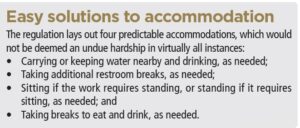Jan 2025 – HR Liability – Pregnant Workers Fairness Act Lawsuits Spike

SINCE THE Pregnant Workers Fairness Act took effect in June 2023, there’s been a huge spike in lawsuits against employers alleging failure to reasonably accommodate workers covered by the landmark legislation.
In the first 11 months following enactment of the law, the Equal Employment Opportunity Commission received 1,869 complaints from workers who allege their employer failed to provide them with reasonable accommodation under the PWFA, according to an article in Business Insurance, a trade publication.
As a result, the EEOC has taken action and between Sept. 10 and Oct. 11, 2024 it initiated four federal lawsuits against companies over alleged violations of the law.
The recent activity should be a wake-up call to employers to put as much effort into complying with this new law as they do the Americans with Disabilities Act, which is similar to the PWFA in that it requires employers to initiate an interactive process with a worker who seeks reasonable accommodations under the act.
The law
Essentially, the PWFA requires employers to make reasonable accommodation for workers covered by the act if they request it, particularly if they are temporarily unable to perform one or more essential functions of their job due to issues related to their pregnancy or recent childbirth.
“Reasonable” is defined as not creating an “undue hardship” on the employer. “Temporary” is defined as lasting for a limited time, and a condition that may extend beyond “the near
future.” With most pregnancies lasting 40 weeks, that time frame would be considered the near future.
What’s required
The law requires employers, absent undue hardship, to accommodate job applicants’ and employees’ “physical or mental condition related to, affected by, or arising out of pregnancy, childbirth, or related medical conditions.”
The condition does not need to meet the ADA’s definition of disability and the condition can be temporary, “modest, minor and/or episodic.”
The PWFA covers a wide range of issues beyond just a current pregnancy, including:
• Past and potential pregnancies
• Lactation
• Contraception use
• Menstruation
• Infertility and fertility treatment
• Miscarriage
• Stillbirth
• Abortion.
Reasonable accommodation
The law’s definition of reasonable accommodation is similar to that of the ADA.

The takeaway
The PWFA poses an employment liability risk and employers will need to ensure that they properly handle and respond to accommodation requests under the PWFA.
Employers should ensure that personnel who are responsible for handling accommodation requests under the ADA are also trained in how to respond to requests under the PWFA.

